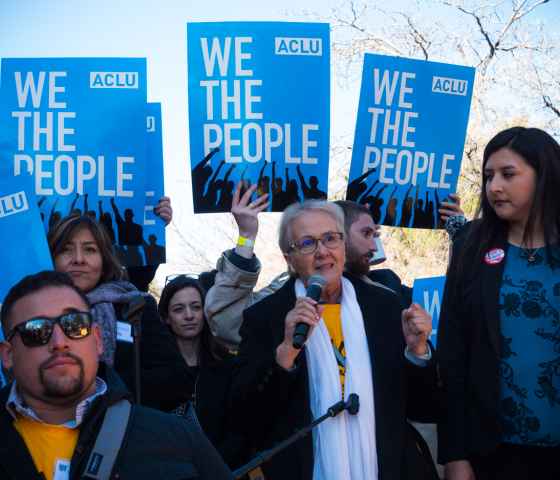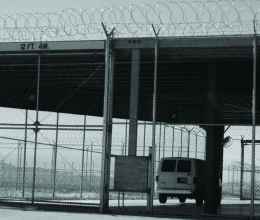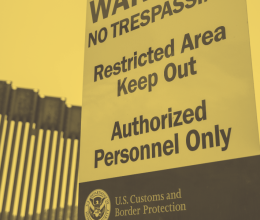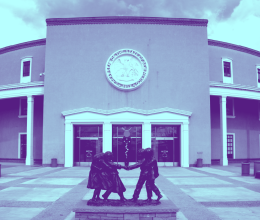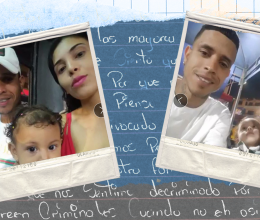First rolled out in early 2019, the Migrant Protection Protocols (MPP) program was among the most controversial immigration policies of the Trump Administration. President Joe Biden called the program, which required migrants to wait in Mexico while their immigration cases were processed, inhumane and his administration issued a memo ending it.
Missouri and Texas sued to stop that decision, and in early December the Biden Administration restarted an expanded and somewhat tweaked version of MPP, also known as Remain in Mexico. Litigation is ongoing to end MPP, but in the meantime migrants enrolled in the program are forced to wait in Mexico, where U.S. and Mexican authorities have failed to establish enough shelters, and where migrants are often released with few financial resources or access to necessary healthcare or food. Migrants separated from family, friends, and support networks in the U.S. are relying on overtaxed Mexican organizations that weren’t set up to support migrants for months or even years while their immigration cases are processed.
That has left them exposed to transnational criminal organizations that prey on desperate and vulnerable migrants, many of whom don’t speak Spanish and lack support networks in northern Mexico.
ACLU of New Mexico Senior Staff Attorney Rebecca Sheff explained what’s different with MPP this time around, what’s at stake for migrants in the program and where efforts stand to end it:
Q: Did the Biden Administration end the Migrant Protection Protocols earlier this year? Why are they now restarting it?
A: Biden ran on a campaign promise to end MPP, and Jill Biden herself actually came and toured one of the refugee camps in Matamoros, south of the border in South Texas, and made really strong statements during the campaign recognizing the inhumanity of MPP. So, Biden suspended the program when he first took office, and he terminated it in June. MPP is back now because the states of Texas and Missouri sued the Biden Administration and they were able to get a court order, an injunction, directing the Biden Administration to re-implement MPP in good faith. And so that's why we're in the situation we're in today.
Q: Who is going to end up in this program?
A: There are some different choices being made by this Administration than the Trump Administration. In many ways that actually looks like an expansion of MPP. When MPP started in 2019 it was only being applied to people from the countries in the Northern Triangle (which consists of El Salvador, Guatemala, and Honduras) and then under Trump, it was expanded to be applied to all “Spanish speaking” countries in Central and South America, as well as Brazil, with some exceptions for unaccompanied children and vulnerable populations. Under Biden they've taken a step further in terms of expanding the nationalities that MPP applies to, to say it applies to people from all across the Western Hemisphere. So that would include Caribbean countries like Haiti and Jamaica whose citizens last time around were not subject to MPP.
Fundamentally, MPP is being applied to asylum seekers. These are people coming to the border of the United States who want to start the process of requesting asylum, and because the ports of entry are closed, they can't come to the bridge and safely request asylum there because of other policies that have been in place during the pandemic under Title 42. People are forced to make the hard choice to cross the border in between ports of entry and they now run the risk that they'll be sent back to Mexico under MPP.
People are forced to make the hard choice to cross the border in between ports of entry and they now run the risk that they'll be sent back to Mexico under MPP.
Q: That traditional approach of going to a port of entry and requesting asylum is no longer an option?
A: It's not an option currently because you literally have immigration officers standing in the middle of the bridges, standing at the ports of entry, blocking people from crossing to request asylum and start the process of applying for asylum. You know, historically, that option was available to folks and it's also legal under US law for people to cross the border and then request asylum. Both pathways had been open because our laws recognized that people seeking protection might not be able to come to a bridge and, you know, stand in line and start the process that way and that they still deserve the opportunity to seek asylum. But during the pandemic, the option to present yourself at a port of entry has been effectively shut down.
Q: What else has changed under this reimplemented MPP?
A: The Biden Administration has made some tweaks to how it’s implementing the MPP program. Many of these tweaks are just window dressing. It doesn't make MPP a fair process, it doesn't protect people from harm while they're being forced to wait in Mexico. It does respond to some issues that were really concerning under the earlier version of MPP.
So the Biden Administration has somewhat extended the list of people who are considered so-called vulnerable populations that shouldn't be subject to MPP. Under the Trump Administration, unaccompanied children and certain people with physical or mental health issues were treated as exempt from MPP. Biden has adapted that list and expanded it to include some elderly people as well as LGBTQ folks, recognizing that people who are queer are at heightened risk of harm if they're forced to wait in Mexico. But the question of who's making that determination really matters because that's in the hands of CBP (U.S. Customs and Border Protection). And that's a process that happens behind closed doors where people don't have access to attorneys to advocate that they should be exempt based on their vulnerabilities.
And then there are some tweaks that the Biden Administration has made to essentially screen out people who are afraid of being sent back to Mexico because they'll be targeted and harmed based on their race, religion, nationality, political opinion, or social group, basically that they'll be persecuted in Mexico.
Q: What’s the risk for people who are in this program, why are they and advocates so worried about having to wait in Mexico?
A: Under the prior version of MPP, ever since the beginning, what we've seen is that MPP has been hugely profitable for the cartels. Organized crime has effectively turned MPP into a massive kidnapping and ransom program and we know that people being put into MPP are being specifically targeted for harm in Mexico from the very moment that they step foot off the bridge. There were kidnappings under the prior version of MPP, you know, documented kidnappings happening in broad daylight, assaults, rapes, people being held incommunicado until family members in the U.S. paid up or else they faced serious harm or death.
Organized crime has effectively turned MPP into a massive kidnapping and ransom program
It's hard to stress enough how hard it is for people to find shelter, stable housing in Mexico once they're put into MPP. And so people end up exposed to really serious and ongoing harm, not just at the hands of organized crime, but also at the hands of Mexican officials.
Q: How long might people end up waiting in Mexico for their cases to be processed?
A: The immigration courts are dealing with extreme backlogs and have been for years and the Biden Administration has indicated that they're expecting immigration judges to prioritize the cases of people put in MPP, but even then it’s not like you have just one hearing and your case is done. Immigration cases typically take at least three if not four hearings or even more and if someone is ordered deported by an immigration judge, they have the right to appeal. That appeals process can take months if not years. And even then the case might be sent back to the immigration judge for another hearing. So the Biden Administration has apparently guaranteed Mexico that cases of people in MPP will last no more than six months, but that's really an empty promise. They made that same promise last time around under Trump when MPP was originally implemented, and quickly had to walk it back because it was just impossible for the courts to meet that kind of timeline. So it means folks will remain stuck in Mexico for many months, if not a year or more, under this program.
Q: What comes next for MPP considering the Missouri and Texas lawsuit that led to its re-implementation?
A: I think it's important to emphasize that the Biden Administration wasn't required to restart MPP in the way that it is, and there's still a court case that's ongoing to challenge the court order that instructed the administration to implement MPP in good faith. Even before that court order was issued, it was reported in the press that there were senior officials in the Administration who already were eager to look again at MPP and potentially re-implement it as a deterrence strategy at the border. So the choices that the Biden Administration made about how quickly to start up this program again and how in some ways they've expanded who it can be applied to, that goes beyond what they were ordered to do in the court and speaks, I think, to the Biden Administration's broader hostility to asylum seekers and unwillingness to reopen the borders and restore asylum, and instead, they’ve embraced and expanded some of the worst parts of the Trump Administration’s immigration policies.
Q: What are the efforts to end MPP once and for all?
A: There are a couple of different lawsuits challenging MPP and the case between the states of Texas and Missouri and the Biden Administration is still ongoing. After that court order instructing the Biden Administration to re-implement MPP in good faith, the Biden Administration did issue a new memo essentially explaining and re-justifying why it's seeking to end MPP, which is paradoxical because at the same time they're re-implementing it. But they did put out a new memo in late October formally again terminating MPP and explaining why that's the position the Administration is taking. And so, the government is now back in court trying to get this injunction lifted so that they can terminate MPP again.
Apart from that, there's ongoing litigation challenging MPP that the ACLU is involved with, as well as cases that other groups have brought. The ACLU litigated all the way up to the Supreme Court a case called Mayorkas v. Innovation Law Lab that challenged MPP from the very beginning as an unlawful application of the statute. And there's been other lawsuits since then challenging things like access to counsel, families being put into MPP, people with disabilities being put into MPP, unaccompanied children being disadvantaged from having been put into MPP, as well as the particular risks to people being sent to the state of Tamaulipas in Mexico as part of MPP. The ACLU has been involved in a number of those challenges. As the Biden Administration has restarted MPP now, many of those challenges which had been on pause because the program was terminated are now being reinvigorated and looked at again by the courts.
